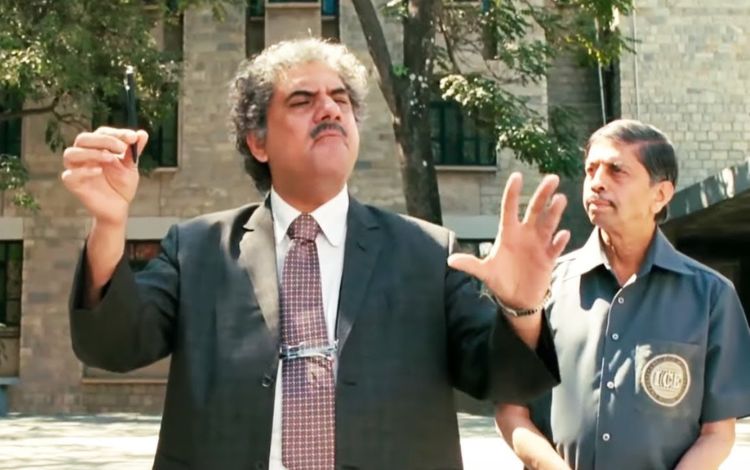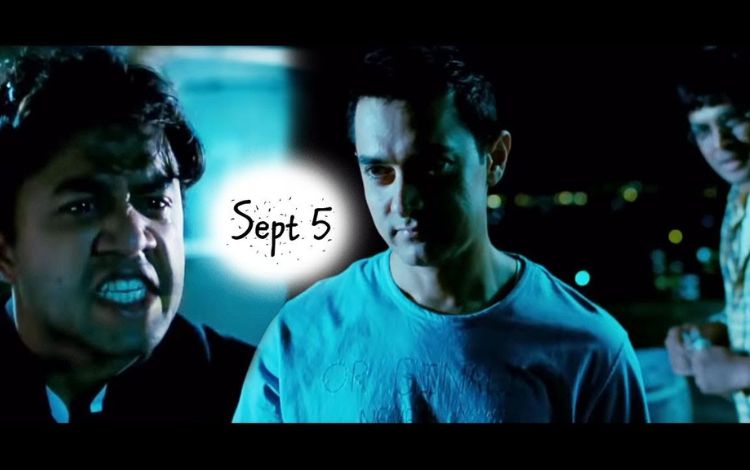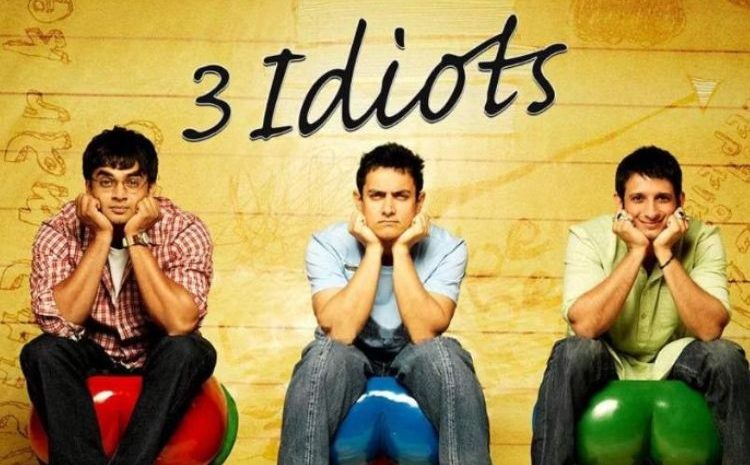3 Idiots: A Movie Blending logic with a Little Pinch of Unrealism
“3 Idiots” is a Bollywood masterpiece that goes beyond cultural borders and connects with people worldwide. While it might seem like a fun comedy, it actually hides some valuable life lessons that can help us logically in our personal and professional lives.
Rancho: The Pursuit of Passion
The main character of the film, Ranchoddas “Rancho” Chanchad, played by Aamir Khan, teaches us a bunch of cool stuff by which success will follow us. First, he says we should do what we love, rather than succumbing to societal pressures and expectations. He also shows us that being super smart in your educational institute isn’t the only way to succeed. You can be creative and solve problems in your own unique way. He challenges the conventional notion that grades are the sole measure of intelligence and emphasizes the importance of critical thinking, creativity, and problem-solving skills.
And guess what? Being nice and working together with people is way better than being mean and super competitive. Moreover, Rancho’s compassionate nature and his willingness to help others without expecting anything in return underscore the importance of kindness and collaboration in our personal and professional lives. In a world often driven by cutthroat competition, his character serves as a reminder that Success can be more meaningful when it’s shared. So, Rancho’s like a superhero doing things the right way!
Farhan and Raju: Breaking Free from Expectations

Farhan Qureshi, acted by R. Madhavan, and Raju Rastogi, played by Sharman Joshi, represent the struggles of individuals trapped in the web of societal expectations and familial pressures. Farhan is passionate about wildlife photography but is compelled into pursuing engineering by his family, while Raju is burdened by financial difficulties and the weight of his family’s hopes.
In “3 Idiots,” Farhan and Raju’s experiences remind us that lots of people do what society expects, even if it means giving up on their own dreams. But these characters show us that it’s important to think about what we really want and be brave enough to go after it, even if it’s not what everyone else is doing. It’s like finding your own path, and that’s a really important thing to do. So, they teach us to be true to ourselves and not always follow the crowd.
The lesson here is to prioritize self-discovery and make choices that align with our authentic selves. Farhan and Raju’s transformations throughout the film are a testament to the power of resilience and the pursuit of one’s dreams.
Viru Sahastrabuddhe (Virus): The Flaws in the Education System

Dr. Viru Sahastrabuddhe, popularly known as “Virus” and portrayed by Boman Irani, is the typical strict professor who represents the flaws in the traditional education system. “For him, life is a race, and he believes you must always strive to be at the forefront. To him, life is nothing more than a competition.”
Virus’s obsession with grades doesn’t like creative thinking. This is kind of like what happens in real schools where students feel a lot of pressure to get good grades. The movie makes us think about whether it’s right for schools to focus so much on grades and rankings, sometimes forgetting about how we grow as individuals. It tells us we should question the way things are and try to make schools more creative and open to innovation and independent thinking.
Chatur Ramalingam (Silencer): The Perils of Blind Ambition

Chatur Ramalingam, fondly called “Silencer” and portrayed by Omi Vaidya, represents the psycho side of blind ambition. His character is obsessed with achieving the highest grades and winning at any cost, even turning to unethical means. He would memorize lessons without understanding, which is a pointless activity for a student. Just memorizing to get good grades doesn’t help a student learn and apply knowledge in the real world.
His character shows us that being super ambitious and ignoring what’s right and wrong can lead to trouble. It’s like a warning that we should always be honest and do things the right way, even if it takes more time and effort. He challenged Rancho, saying that after 10 years, on Sept 5, they would meet to compare who had become more successful and who was the real ‘idiot.’ This reflects Chatur’s vengeful determination to do whatever it takes to achieve success. The movie tells us to value honesty, hard work, and doing our best in a fair and honest way.
“3 Idiots” is known for its humor and exaggerated scenarios, some of which are illogical and unrealistic.
Rancho’s Multiple Identities: Rancho’s ability to maintain multiple false identities while attending college for years without getting caught is highly unrealistic. It’s portrayed in the film for comedic effect, but in reality, it would be nearly impossible for someone to maintain such a charade.
Rancho’s Engineering Gadgets: Rancho’s ability to build complex engineering devices, such as the automated delivery system for the baby, with limited resources and in a short amount of time is highly unrealistic. Engineering projects like these typically require extensive planning, resources, and time.
The Virus’ Revenge: The final scene of the movie where Virus seeks revenge by trying to humiliate Rancho at a public event seems exaggerated. It’s unlikely that a respected professor would resort to such antics in real life.
The Graduation Ceremony: The graduation ceremony at the end of the movie takes place in a very unrealistic and dramatic setting, with Rancho parachuting into the ceremony and making a grand entrance. In reality, graduation ceremonies are much more formal and structured.
The “All Izz Well” Song: While the “All Izz Well” song is a catchy and memorable part of the movie and also gives relief from stress for some moments, the idea that singing a song can magically solve all problems is highly unrealistic.
The Engineering Exam Scene: The scene where the characters manage to break into the office of the university’s director and change their exam papers is implausible. Security measures at educational institutions are typically much tighter.
The Interview scene of Farhan: Interviews of real-life can’t be passed only by confidence or emotional talks. In engineering, it checks the first candidate’s skills and ability for their jobs.
Ambition of getting good grades is not bad: Every student has their own unique path to a successful career. Chatur’s approach was to memorize lessons without necessarily understanding them, but it’s important to recognize that ambition and dedication should be nurtured in every student. Chatur’s story shows that persistent effort can lead to success, and that every bit of studying adds value. Not everyone has the same level of creative thinking as someone like Rancho, so it’s essential, like Farhan, to never give up and work hard to gain knowledge.
In conclusion, “3 Idiots” is more than just a Bollywood blockbuster; it’s a repository of valuable life lessons. Through its memorable characters, it offers a holistic view of the challenges and opportunities of pursuing passion, breaking free from expectations, being innovative and logical, challenging the flaws in the education system, and emphasizing the importance of ethics in our journey to success.
In the end, the film’s enduring message is clear: it’s not about being an “Idiot” or a “Genius”; it’s about being true to oneself and striving for excellence with compassion, creativity, and integrity.
Writer
Fariha Zannat
Intern, Content Writing Department
Requin BD





3 Comments
34.01htb4s0m2xb9dag96txt10c2n@mail4u.pw
March 31, 2024
dolor rem qui magnam officiis molestias laborum voluptate. asperiores sed maxime saepe dolor non illo ipsa quia dolor fugit autem ut est. at soluta qui et consequatur ea est eius quia ex omnis et omni
https://www.Waste-ndc.pro/community/profile/tressa79906983/
May 22, 2024
I enjoy what you guys are up too. Thhis type of clever work and reporting!
Keep up tthe awesome works guys I’ve added you guys to my personal blogroll. https://www.Waste-ndc.pro/community/profile/tressa79906983/
Tandy Connery
October 9, 2024
Nice post! You have written useful and practical information. Take a look at my web blog UQ6 I’m sure you’ll find supplementry information about Domains you can gain new insights from.